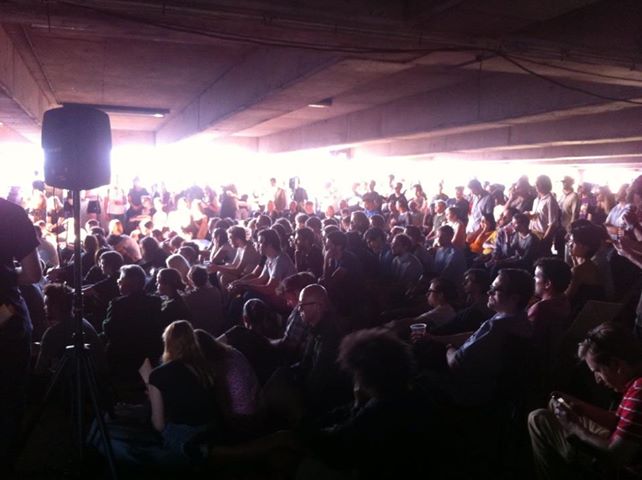City’s Department of Music was happy to sponsor the first edition of the London Contemporary Music Festival, which took place from 25th July – 4th August at Peckham multi-storey car park. The festival featured performances from an array of artists including Glenn Branca, Tony Conrad, Jane Chapman, SND, Leon Michener, Max Baillie, and many others.
Current MA student Sam Mackay was co-director of the festival, and recent PhD graduates Peiman Khosravi and Erik Nyström were the audio engineers for most of the events. Both were also involved as performers: Peiman Khosravi performed Bernard Parmegiani’s ‘De Natura Sonorum’ and the tape part for his piece ‘Violostres’; Erik Nystrom performed his own 2012 piece ‘Catabolisms’. Finally, another recent PhD graduate, Ambrose Seddon, gave the world premiere of his piece ‘Secure’, inspired by the sounds of the womb.
The festival was the brainchild of four young contemporary music enthusiasts with a shared desire to bring new classical music to dynamic, appropriated spaces. At the same time, it was crucial to mobilise the best talent the scene had to offer, even booking iconic artists based abroad such as Charlemagne Palestine and Tony Conrad. Discussing the festival’s ambitious approach in The Daily Telegraph, critic Ivan Hewett said the following:
“This determination to seize the moment and “kiss the joy as it flies”, is exciting. One feels the tremor of something that touches on real cultural energies, which is at least as valuable as any purely musical experience the event might offer. Everything has happened at top speed; the tickets mostly melted away within a few days of the festival’s announcement… All this has happened in joyous defiance of the accepted way of launching an arts festival”
A controversial debate was sparked following the festival’s climax, a sprawling 90 minute piano recital by Mark Knoop which culminated in a performance of Philip Corner’s Piano Activities. The piece, which calls for the destruction of the piano, was described by The Guardian as ‘morally dubious’ and ‘creatively redundant’, charges which were fiercely debated by a number of musicians and critics in the subsequent days.


